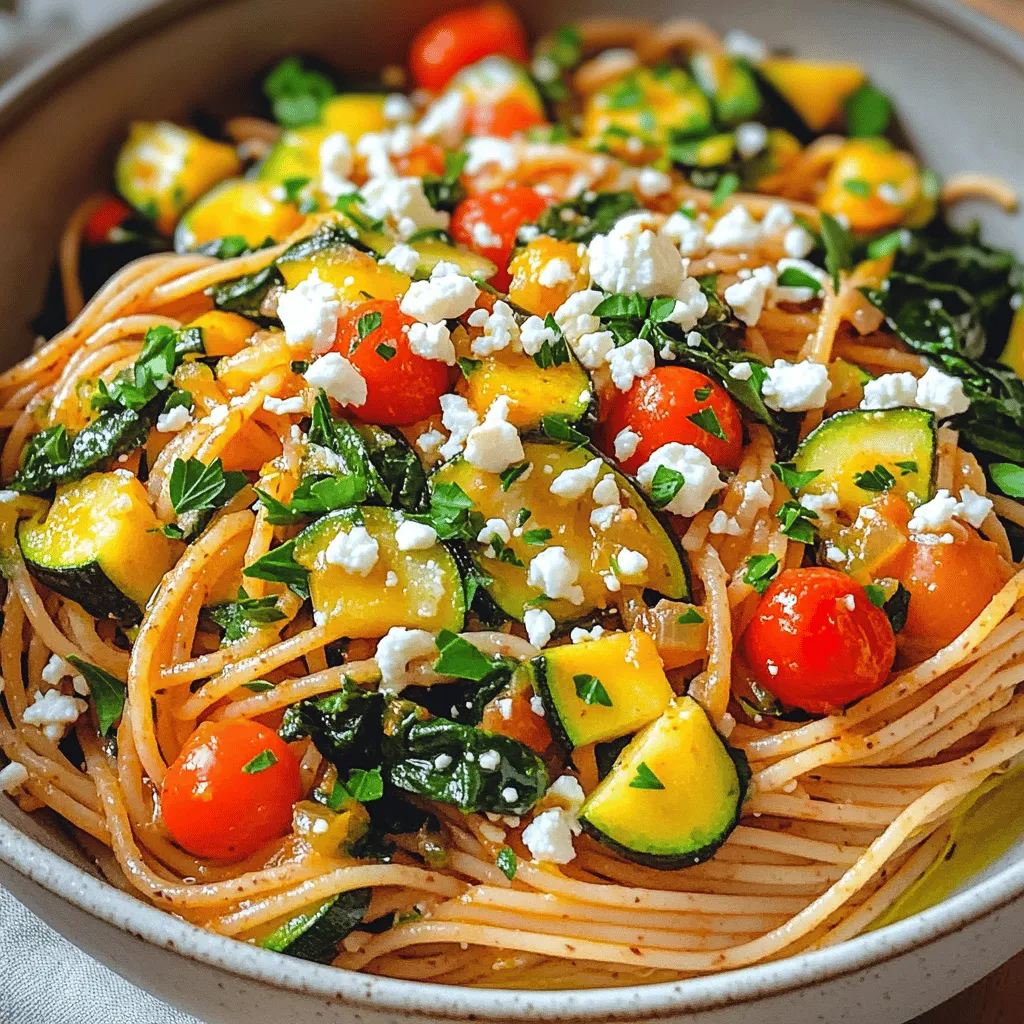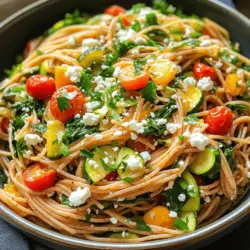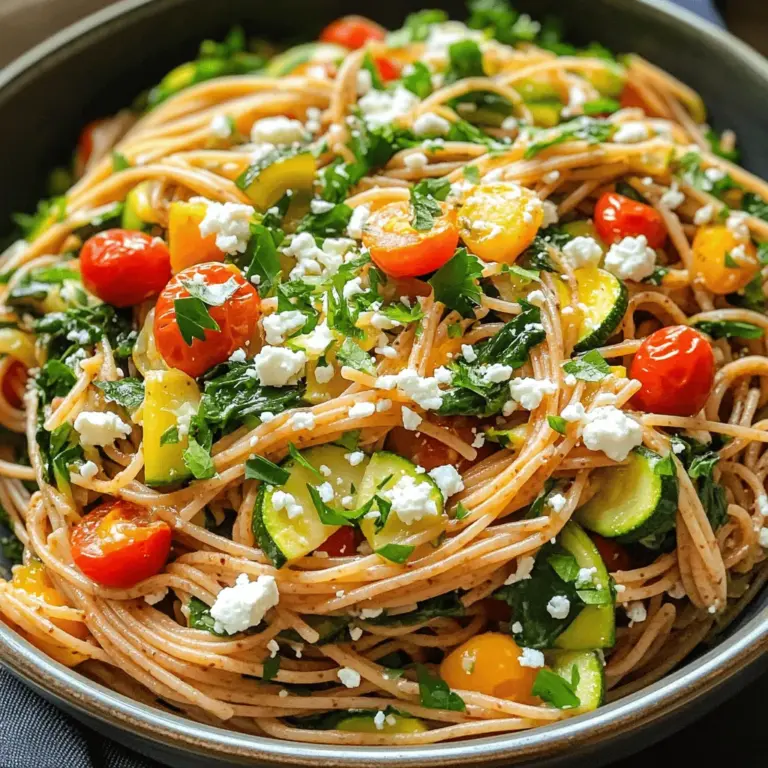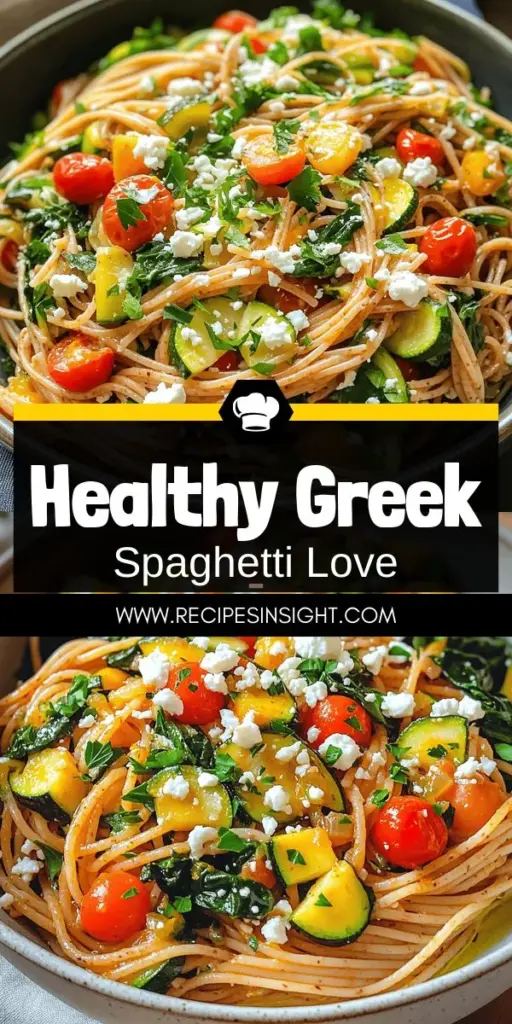Looking for a dish that’s both healthy and packed with flavor? Let me introduce you to Healthy Greek Spaghetti! This light meal combines whole wheat pasta with vibrant vegetables and Mediterranean spices. It’s simple to make, and you can tweak it for your taste. Get ready to learn how to create a dish that’s not only good for you but also feels like a treat! Let’s dive in!
Ingredients
Main Ingredients for Healthy Greek Spaghetti
For Healthy Greek Spaghetti, you need simple and wholesome ingredients. Here’s what you’ll use:
– 8 oz whole wheat spaghetti
– 2 tablespoons olive oil
– 2 cloves garlic, minced
– 1 small red onion, finely chopped
– 1 medium zucchini, diced
– 1 red bell pepper, diced
– 1 cup cherry tomatoes, halved
– 1 cup spinach, fresh
– 1 teaspoon dried oregano
– 1 teaspoon dried basil
– 1/2 cup feta cheese, crumbled
– Salt and pepper to taste
– Fresh parsley, chopped (for garnish)
These main ingredients bring a burst of flavor and nutrition to your meal.
Mediterranean Flavor Boosters
To enhance the taste, I use Mediterranean herbs and spices. Dried oregano and basil give depth to the dish. Fresh garlic adds a nice punch. Olive oil is key, making everything rich and smooth. Cherry tomatoes burst with sweetness, while feta cheese brings a salty tang. This blend of flavors showcases the vibrant Mediterranean cuisine.
Healthy Substitutions to Consider
You can make healthy swaps to suit your diet. Try using gluten-free pasta if needed. Instead of feta, use a plant-based cheese for vegan options. For extra veggies, add broccoli or eggplant. You can also reduce the amount of oil. This recipe is flexible for your taste and health goals. Feel free to mix and match!
For the complete dish, check out the Full Recipe to bring this meal to life.
Step-by-Step Instructions
Cooking the Whole Wheat Spaghetti
First, bring a large pot of salted water to a boil. Add 8 ounces of whole wheat spaghetti. Cook it according to the package instructions until it’s al dente. Al dente means the pasta is firm to the bite. This usually takes about 8 to 10 minutes. Once it’s done, reserve half a cup of the pasta water. Drain the spaghetti and set it aside.
Sautéing the Vegetables
Now, grab a large skillet and heat 2 tablespoons of olive oil over medium heat. Add 2 cloves of minced garlic and 1 small chopped red onion. Sauté these for about 2 to 3 minutes. You want them to become translucent and fragrant. Next, stir in 1 medium diced zucchini and 1 red bell pepper, diced. Cook for 5 to 7 minutes until they soften. Then add 1 cup of halved cherry tomatoes and 1 cup of fresh spinach. Stir until the spinach wilts.
Combining and Seasoning All Elements
After the veggies are ready, it’s time to combine everything. Add the cooked spaghetti to the skillet. Toss it well with the vegetable mixture. If it looks dry, use some reserved pasta water to moisten it. Next, sprinkle in 1 teaspoon of dried oregano and 1 teaspoon of dried basil. Season with salt and pepper to taste. Gently toss to mix everything. Finally, fold in 1/2 cup of crumbled feta cheese. The heat will warm the cheese nicely. Serve your Healthy Greek Spaghetti in deep bowls. Garnish with chopped parsley for a fresh touch. You can find the full recipe for more details.
Tips & Tricks
How to Make Your Spaghetti Healthier
To make your spaghetti healthier, choose whole wheat pasta. Whole wheat has more fiber than regular pasta. Fiber helps keep you full longer. You can also add more veggies to your dish. Try using zucchini, bell peppers, and spinach. These add nutrients and color. Use less oil by sautéing veggies with a splash of water. It cuts calories without losing flavor. You can also skip or reduce the cheese for fewer calories.
Best Practices for Cooking Pasta
Cooking pasta may seem simple, but small steps matter. Start with a big pot of water. Use plenty of water to avoid sticky pasta. Add salt to the water for flavor. Bring it to a rolling boil before adding the spaghetti. Stir the pasta often to keep it from clumping. Cook until al dente, which means firm to the bite. Reserve some pasta water before draining. This water helps create a creamy sauce later.
Serving Suggestions and Presentation Tips
How you serve your dish makes a big difference. Use deep bowls for a nice presentation. This allows you to layer the spaghetti and veggies. Sprinkle extra feta cheese on top for a burst of flavor. Fresh parsley adds color and freshness. Drizzle a little olive oil on top for shine. If you want to impress guests, add a lemon wedge on the side. This adds a zesty kick that pairs well with the dish. For the full recipe, check out the detailed steps above.

Variations
Protein Additions for a Hearty Meal
You can add protein to Healthy Greek Spaghetti to make it more filling. Here are some great options:
– Grilled Chicken: Slice cooked chicken breasts and mix them in.
– Shrimp: Sauté shrimp in olive oil until pink and toss them in.
– Chickpeas: Add canned chickpeas for a plant-based option that’s hearty.
– Ground Turkey: Brown ground turkey and mix it with the veggies.
These proteins not only boost the meal but also add flavor and nutrients.
Flavor Variations with Different Vegetables
Feel free to switch up the veggies in your Healthy Greek Spaghetti. This keeps the dish fresh. Consider these options:
– Artichokes: Add canned artichoke hearts for a tangy taste.
– Olives: Slice black or green olives to add a briny punch.
– Broccoli: Steam broccoli florets and toss them in for crunch.
– Asparagus: Sauté asparagus for a tender, earthy flavor.
These changes can help you use what you have on hand and keep things exciting.
Alternative Cheese Options
Feta cheese gives a nice tang to the dish, but you can try other cheeses too. Consider these alternatives:
– Goat Cheese: Crumbled goat cheese adds a creamy, tangy flavor.
– Parmesan: Grate fresh Parmesan for a salty touch.
– Ricotta: Dollop fresh ricotta for a creamy texture.
– Nutritional Yeast: Use this for a vegan cheese flavor without dairy.
Experimenting with different cheeses can create new flavor profiles in Healthy Greek Spaghetti. Each choice brings its own twist to the dish. For the complete recipe, refer to the Full Recipe.
Storage Info
Best Practices for Storing Leftovers
Store your Healthy Greek Spaghetti in an airtight container. This keeps it fresh and tasty. Let the spaghetti cool down before sealing. Refrigerate within two hours of cooking. This method will keep your dish good for up to three days.
Reheating Instructions
When it’s time to eat again, reheat your spaghetti gently. Use a microwave or a pan on low heat. Add a splash of water or olive oil to avoid dryness. Heat until warm, but don’t overdo it. This keeps the flavors fresh and the pasta from getting mushy.
Freezing Tips for Meal Prep
If you want to save some for later, freezing is a great option. Portion the spaghetti into freezer-safe containers. Leave some space at the top for expansion. It can last up to three months in the freezer. To thaw, move it to the fridge overnight. Reheat as mentioned above for the best taste.
For complete cooking directions and ingredient details, check out the Full Recipe.
FAQs
What can I substitute if I don’t have whole wheat spaghetti?
If you don’t have whole wheat spaghetti, you can use regular spaghetti. Gluten-free pasta works well too. Try zucchini noodles for a low-carb option. Each choice can change the dish’s texture, but it will still taste great.
How can I make this recipe vegan?
To make Healthy Greek Spaghetti vegan, replace feta cheese with a plant-based option. You can use nutritional yeast for a cheesy flavor without dairy. Ensure that your pasta is egg-free. Adding more veggies can give it extra flavor and nutrition.
What are the health benefits of using Mediterranean ingredients?
Mediterranean ingredients promote heart health and reduce chronic diseases. They are rich in healthy fats, fiber, and vitamins. Olive oil provides good fats, while vegetables add antioxidants. Feta cheese offers protein and calcium, making this dish both tasty and nutritious.
Healthy Greek spaghetti combines whole wheat pasta with fresh veggies and flavors. You learned about key ingredients, cooking steps, and how to boost health. I also shared storage tips and answers to common questions. Keep this recipe in mind for simple meals that are good for you. Customize it with your favorite protein or veggies for variety. Enjoy your cooking adventure and make it healthier every time!


